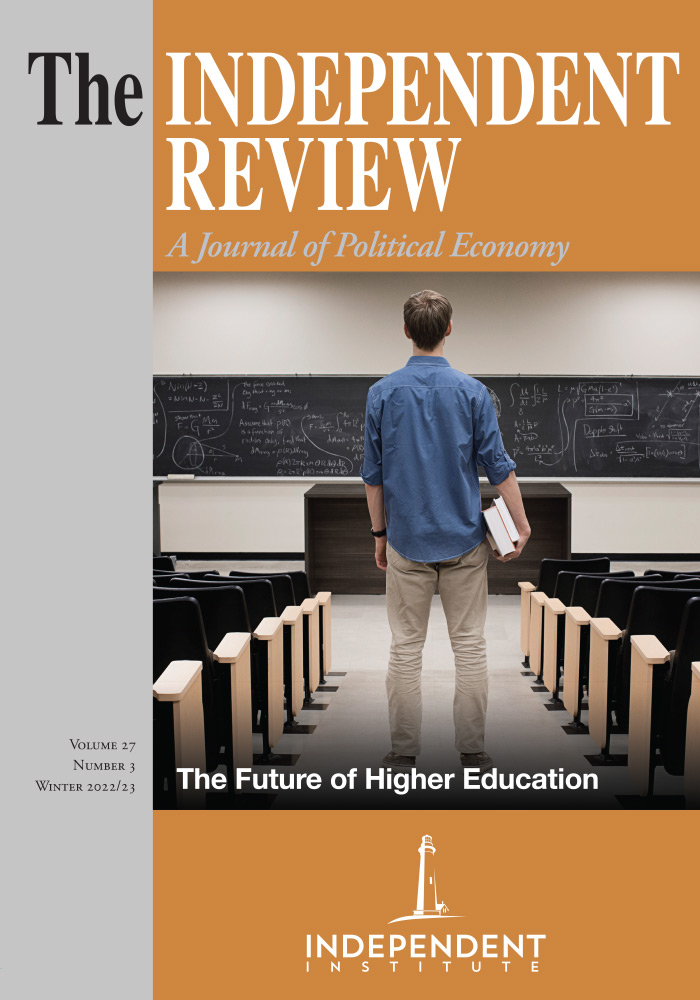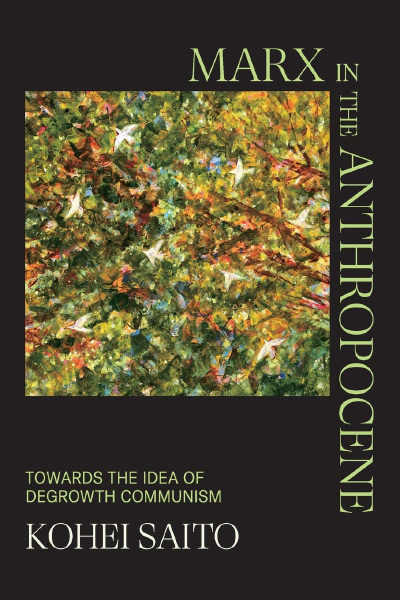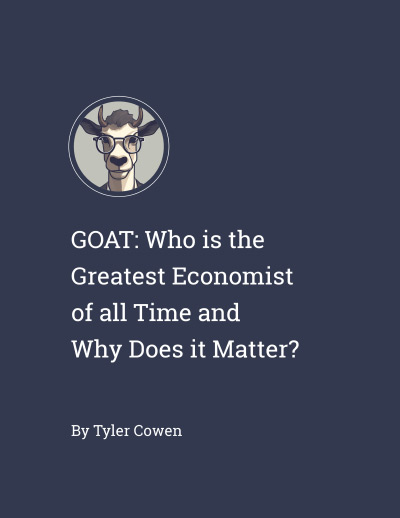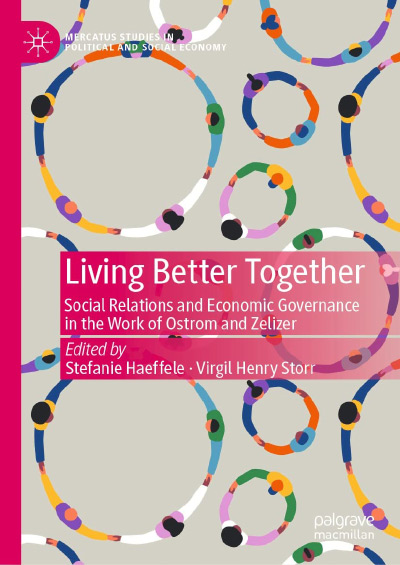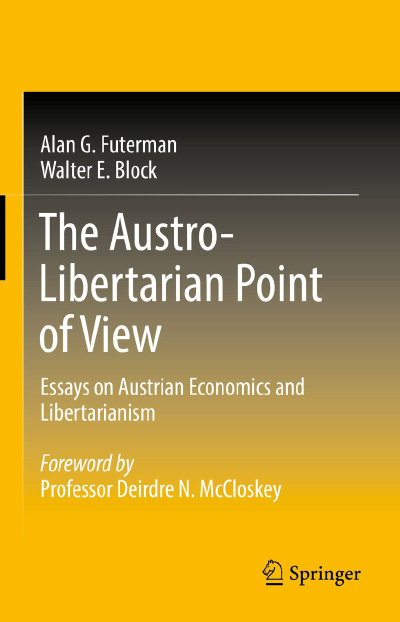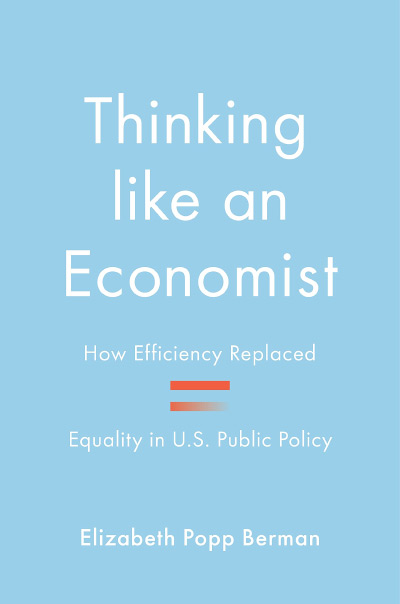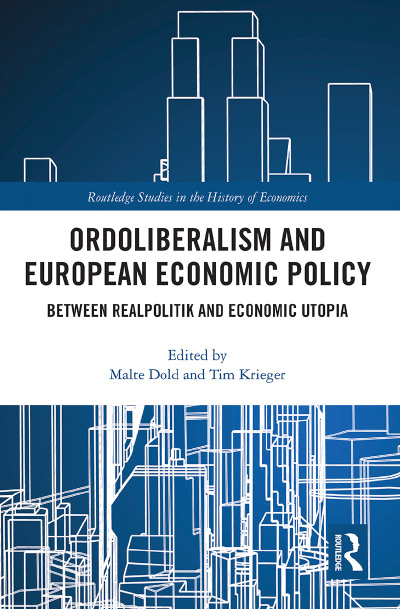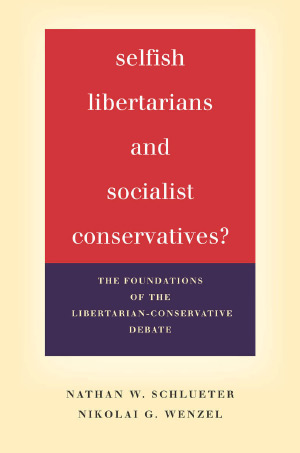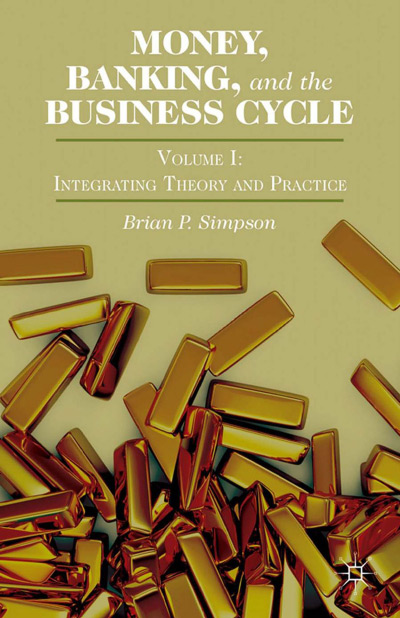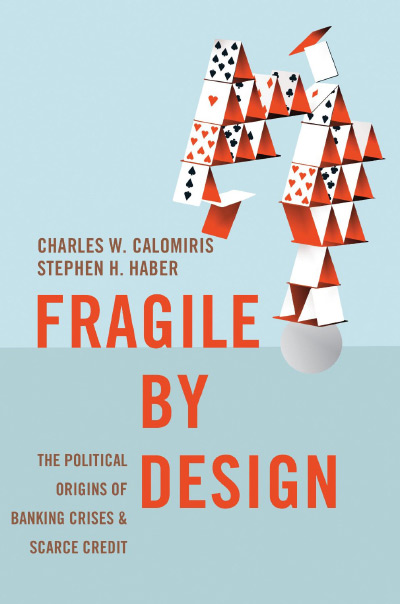Seven, seven, seven deadly sins
That's how the world begins
Watch out when you step in
For seven deadly sins
Seven deadly sins
That's when the fun begins.
—
“7 Deadly Sins,” Traveling Wilburys
Seven Deadly Economic Sins is a wonderful read and a lovely tribute to economics from a gifted Smithian philosopher. As both a philosopher and political economist, James Otteson is uniquely equipped to unpack economics in a way that examines not only what we can “truck, barter, and exchange” but what we can achieve in a moral sense along the way.
Otteson outlines his project as follows, “my discussion is inspired by Adam Smith, who is widely considered the father of the discipline of economics but who was also, and primarily, a moral philosopher....As Smith’s pioneering example demonstrates, an economics worth considering must integrate with our natures and values as moral beings” (p. xvii). These dual Smithian threads of market exchange and moral virtue are woven into the book throughout. He goes on to explain, the “book is based on the assumption that we all want a just and humane society—that, wherever we are on the political or economic spectrum, we all want a society whose public institutions protect justice and in which people are able to construct for themselves lives of meaning, purpose, and happiness. My argument will be that increasing prosperity—not just wealth, but widespread and increasing opportunity for flourishing lives—is a necessary prerequisite of a life worth leading and of public institutions worth supporting. Economics can help us achieve prosperity, even if it cannot tell us exactly what we should do with our prosperity. And economics can highlight several mistakes in reasoning that we are prone to make. Exposing those mistakes can enable greater prosperity and thus increase the chances of ever more of us leading genuinely flourishing lives. Or so I will argue” (p. 3).
The book highlights these mistakes using a list of seven deadly economic sins. By looking at common fallacies in economic reasoning, Otteson takes a different tack than other popular takes on the field (for example, see Dani Rodrik, 2015, Economics Rules: The Rights and Wrongs of the Dismal Science, New York: W.W. Norton) by putting the onus on those who would reject the underlying principles of the dismal science. Rather than defend what economics can tell us, he shows how rejecting these popular economic fallacies will make us better human beings.
In the first chapter, Otteson discusses the “Wealth is Zero-Sum Fallacy,” which he begins with a strong assertion regarding our moral agency. “I submit that a fundamental moral premise that should inform all our dealings with others is recognition of their equal moral agency” (p. 19). He then compares resource extraction to cooperative exchange in a way that demonstrates how markets lead to mutual prosperity while extraction only garners a redistribution of resources (at best). He offers the “opt-out option” as a way of determining whether interactions are positive- or negative-sum. For example, if a suitor (Jack) betrothed to a would-be partner (Jill) finds his desires thwarted by a competing suitor (Joe), then Jack would not have cause to claim harm given that Jill is an “equal moral agent’ and therefore free to opt out of the exchange.
The chapter also recognizes the sixteen-fold increase in wealth that has accumulated over the past two hundred years (see Deirdre McCloskey, 2016, Bourgeois Equality: How Ideas, Not Capital or Institutions, Enriched the World, Chicago: University of Chicago Press). This “mass flourishing” as Nobel Prize-winning economist Edmund Phelps (2013, Mass Flourishing: How Grassroots Innovation Created Jobs, Challenge, and Change, Princeton, N.J.: Princeton University Press) terms it, is the result of a reorientation of institutions from resource extraction towards cooperative exchange. Otteson notes that while Jeff Bezos may be the wealthiest person today at $130 billion, this number is far below the wealth in proportion to the size of the economy held by nineteenth century industrialists like Cornelius Vanderbilt ($239 billion), Andrew Carnegie ($310 billion), and John D. Rockefeller ($336 billion).
The second chapter discusses the “Good is Good Enough Fallacy” and approvingly acknowledges the reduction in absolute poverty generated by markets mentioned in the previous chapter. He argues that this change is not automatic but instead requires a “rational economic order” that, following the guidelines provided in Wealth of Nations, limits government to protecting society from violence or invasion, protecting individuals from injustice and oppression, and providing critical public works and institutions (see also Sydney Patton and Jody W. Lipford, 2020, Is the Welfare State Crowding Out Government’s Basic Functions? The Independent Review 25, no. 1: 99 – 104). That is to say, government should confine itself to protection of the three P’s of person, property, and promise. When government exceeds these Smithian boundaries, then “local knowledge” of what best to do with scarce resources is displaced in favor of allocation by authority. As Otteson explains, “because resources are scarce, opportunity cost is real. We ignore it at our peril” (p. 89).
The third chapter discusses the “Great Mind Fallacy,” which largely revolves around the role of experts. While trust in experts is understandable and may even be driven by evolutionary impulses that favor group leaders, it can also lead us to believe that these same experts can make our decisions for us in a way that we would prefer if we were similarly informed. Otteson argues against this line of thinking, termed “libertarian paternalism,” by claiming “there is, unfortunately, no Great Mind who can survey the totality of one’s life, who knows all the possible courses one’s life might take, who can anticipate all the surprises and accidents that emerge in one’s life, or who, therefore, can know what you should do” (p. 108).
He invokes Richard Thaler and Cass Sunstein’s (2009, Nudge: Improving Decisions about Health, Wealth, and Happiness, New York: Penguin) popular “nudge” concept as a means of understanding how no great mind exists to adjudicate everyday disputes. Even experts are often wrong and moreover do not observe the decisions being made by individuals. Echoing economist Roger Koppl (2018, Expert Failure, Cambridge: Cambridge University Press), Otteson claims the role of experts is to be in competition with other experts in offering guidance, which furthermore should be strictly informative instead of coercive. Experts are unfortunately quick to assume authoritarian roles and/or happily endorse others to fill them, leading to cascading expert failure (see Jon Murphy, 2022, Cascading Expert Failure, Journal of Institutional Economics: 1 – 18).
Instead, he offers “eudaimonia,” or living a worthy life, as the operative goal for society (see also Jon Kabat-Zinn, 2009, Full Catastrophe Living: Using the Wisdom of Your Body and Mind to Face Stress, Pain, and Illness, New York: Delta, 315). Individuals must be free to choose a life worth living for themselves, and indeed face the consequences of those choices, to gain practical judgment over life’s circumstances. While planning is a necessity in attaining eudaimonia, it is important to consider who is doing the planning for whom in order to respect individual autonomy.
Otteson concludes the chapter by saying “there is, therefore, no Great Mind who possesses this knowledge and hence can make good decisions for you, or who can construct public policies that would guide each individual on her own unique path toward eudaimonia. The issue is not about whether there will or should be planning or not, but, rather, who will do the planning and for whom. In most cases and regarding most issues, individuals should plan for themselves and their own lives” (p. 119 – 120).
Chapter four discusses the “Progress is Inevitable Fallacy” and begins with statistics about the increasing quality of life that has come with economic progress in the modern age. Following McCloskey, he argues that culture is ultimately responsible for the cooperative behavior necessary for fruitful exchange. The trouble is that we also inherit certain psychological instincts that sometimes clash with our more enlightened preferences (p. 134). Despite this, he argues, we owe it to ourselves to not only trust in other people but to model our own behavior in a way that rewards that trust (p. 136).
Coupled with the insights drawn from the previous chapter, Otteson also shows how the planning fallacy exposes our weakness for getting in the way of economic progress. If anything, he argues, we experience economic growth in the modern world despite the efforts of government. He says that “means that presidents, members of congress, regulators, administrators, and other centralized authorities are ill-positioned to know what decisions any of the rest of us should make” (p. 140).
To conclude this discussion he offers, “We must make our own choices, in voluntary cooperation with others whom we can and do trust, and we must learn, understand, and then uphold and protect the institutions that recognize and respect the dignity and liberty of individuals and that enable prosperity” (p. 145).
The fifth chapter discusses the “Economics is Amoral Fallacy” and makes the argument that the creation of value to gain from profit opportunities is not only efficient in an economic sense but a moral pursuit consistent with eudaimonia in and of itself. The key insight to this relationship is that market competition disciplines entrepreneurship in a way that steers society’s resources to its most effective ends. If people are presumed to be morally equivalent in their agency, that is to say, each person’s right to choose is valued in and of itself, then market outcomes reflect the process of putting these choices into action over time.
Allowing for positive-sum interactions is what markets unwittingly provide for us. We intuit zero-sum strategies in most contexts, and this is perhaps why markets are often considered selfish or otherwise undesirable from a moral point of view. Otteson counters that morality augmented by an economic lens allows us to make more effective use of our resources, appreciate the tradeoffs involved in these choices, and discover what positive-sum opportunities are available.
In the sixth chapter, he discusses the “We Should All Be Equal Fallacy” by comparing different definitions of equality to examine which would lead to eudaimonia. He argues equality of outcome is the least desirable as it entails a leveling of talents to ensure that no person excels a certain threshold. In other words, the very diversity we want to flourish naturally leads to outcomes that are not equal on a variety of metrics.
Otteson concludes the chapter by saying, “We should therefore not seek equality of resources, income, or wealth. But that does not mean that there is no conception of equality that is worth defending. On the contrary, we should defend equality of moral agency, for all people, out of respect for their dignity as rational and autonomous beings. That means respecting their choices, even when we disagree with them” (p. 207).
Chapter seven discusses the “Markets Are Perfect Fallacy,” which attempts to balance the wonders of markets presented in the previous chapters with an appreciation of where markets do not always allocate resources in a way society would prefer. Otteson discusses collective action problems, inequality, and exploitation as prominent examples where markets seem to come up short.
This is partly due to a lack of perspective on what it is that markets ultimately accomplish. After all, just as with programming computer software, the output is ultimately determined by input. In the case of collective action, private parties may allocate resources in a way that generates an externality.
Even if we accept the inequality of material wealth that comes from cooperative exchanges, there may be reasons why inequality per se might still be a concern to a prosperous society. First, it might be that persistent and prominent inequality might trigger social anxieties around the wealth gap. Second, these anxieties could lead to political instability.
Otteson argues that ensuring those living in absolute poverty have access to markets trumps these claims. The expansion of markets has indeed significantly reduced absolute poverty. It has also reduced violence as documented by Steven Pinker (2012, The Better Angels of Our Nature: Why Violence Has Declined, New York: Penguin Books).
What about when the price is not always right? “Exploitation” is a malleable term often levied at market transactions where buyers pay prices considered unfair. But if markets are competitive, then the prices found in worst-case scenarios, even when considered exploitive by an outsider, may very well reflect the opportunity costs under difficult circumstances (e.g., after a hurricane).
The book concludes with the “I Am the World Fallacy.” Otteson tackles what some have labeled mood affiliation (see Tyler Cowen, 2011, “The Fallacy of Mood Affiliation,” Marginal Revolution). in that we find it difficult to respect the choices of others when they run counter to our own moral perspective. He argues that the right to say “no” is paramount to maintaining the modern liberal order. He says, “There is no better way for you to establish your identity as a moral agent, and to assume all the rights, privileges, immunities, and voluntary obligations such a vaunted and previous position entails” (p. 253).
Ultimately, it is our autonomy as individuals that must be sacrosanct to allow for the kinds of human flourishing that occur under eudaimonia. We must also be allowed to fine-tune our practical sensibilities to achieve this outcome. Otteson states, “each person’s proper path to eudaimonia will be unique to that person, and hence, if we value other people as much as we value ourselves, we should give others as wide a scope of individual liberty and responsibility as is consistent with the same scope we and everyone else enjoy” (p. 268 – 269).

